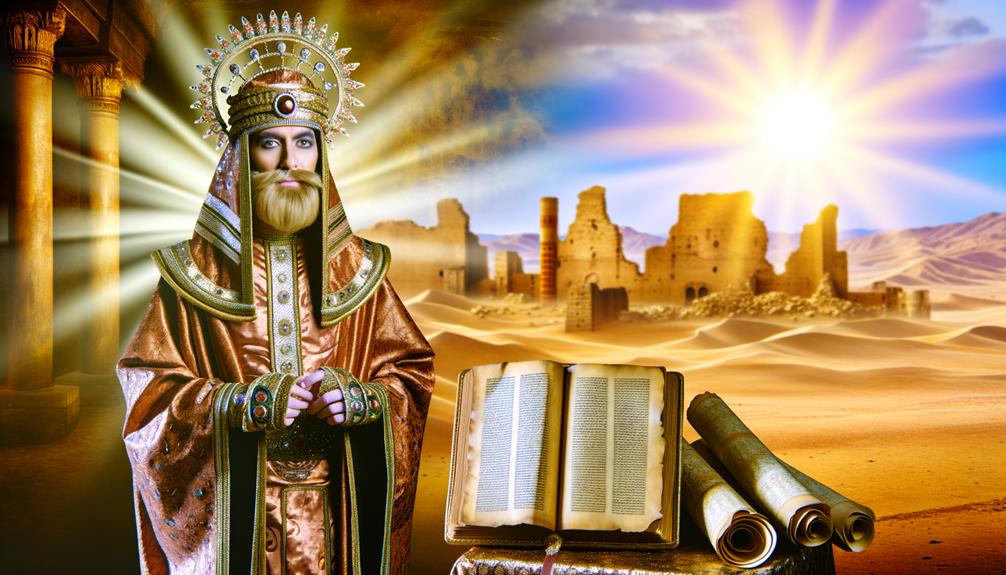Biblical Meaning of the Name Cyrus
The name Cyrus holds profound biblical significance as it is associated with divine providence and prophetic fulfillment. Derived from Old Persian 'Kūruš,' meaning 'like the sun,' Cyrus is depicted in the Bible as a divinely appointed liberator.
His decree allowed exiled Jews to return to Jerusalem and rebuild the Temple, symbolizing divine intervention in human history. In Isaiah, he is referred to as 'His anointed,' highlighting his unique role in Israel's restoration.
The etymology further emphasizes his influence and leadership. To gain a deeper understanding of the multifaceted legacy of Cyrus in biblical contexts, consider exploring further.

Key Takeaways
- The name Cyrus is derived from Old Persian 'Kūruš,' meaning 'like the sun' or 'sun-like.'
- Cyrus is depicted as a divinely appointed liberator and 'His anointed' in the Book of Isaiah.
- His name's etymology signifies influence and leadership, underscoring his role as a providential figure.
- Cyrus's decree allowed exiled Jews to return to Jerusalem and rebuild the Temple, fulfilling divine promises.
- His actions and divine appointment illustrate God's sovereignty and guidance in historical events.
Historical Context of Cyrus
The historical context of Cyrus the Great, the founder of the Achaemenid Empire, is pivotal for understanding his profound impact on both ancient Near Eastern history and biblical narratives.
Emerging in the 6th century BCE, Cyrus unified the disparate Median, Lydian, and Neo-Babylonian empires under a single, innovative governance model, characterized by tolerance and administrative acumen.
His policies of religious and cultural inclusivity resonated deeply within the Jewish community, as evidenced by his decree allowing the exiled Jews to return to Jerusalem and rebuild the Temple, a seminal event recorded in the Bible.
This magnanimous act not only solidified his legacy as a liberator but also established a theological and historical bridge between Persian and Jewish histories, enriching our understanding of both.
Etymology of Cyrus
Building upon Cyrus the Great's historical significance, understanding the etymology of his name provides further insight into his enduring legacy. The name Cyrus is derived from the Old Persian 'Kūruš,' which may be translated to mean 'like the sun' or 'sun-like.' This etymological root underscores the profound impact Cyrus had, illuminating the ancient world much like the sun itself.
Additionally, some scholars suggest an Elamite origin, where the name signifies 'he who bestows care.' These interpretations reveal the multifaceted nature of Cyrus's influence, both as a beacon of leadership and as a nurturer of his people.
The divine connotations associated with his name amplify his role as a figure of providence in history, shaping our understanding of his biblical significance.
Cyrus in Biblical Prophecy
Recognized as a pivotal figure in biblical prophecy, Cyrus is often depicted as a divinely appointed liberator and instrument of God's will. The Book of Isaiah heralds him as 'His anointed' (Isaiah 45:1), signaling a unique role ordained by God. This prophecy emphasizes Cyrus' destiny to facilitate the liberation of the Israelites from Babylonian captivity, fulfilling divine promises.
Such scriptural references underscore the theological premise that political and historical events unfold under divine orchestration. By naming Cyrus specifically, the prophecy not only confirms God's sovereignty but also illustrates a broader narrative of redemption and restoration. This portrayal of Cyrus underscores a profound theological affirmation that world leaders can serve as agents of divine purpose.
Cyrus and the Jewish People
Cyrus's profound impact on the Jewish people is epitomized by his edict, which liberated the exiled Jews and allowed them to return to their homeland.
This decree not only facilitated their physical return but also endorsed the monumental task of rebuilding the Jerusalem Temple, a pivotal symbol of their faith.
The actions of Cyrus, thus, underscore his instrumental role in the restoration of Jewish religious and cultural identity during this critical period in biblical history.
Cyrus's Edict of Liberation
Issuing a decree of liberation in 538 BCE, King Cyrus of Persia played a pivotal role in the return of the Jewish exiles to their homeland and the subsequent reconstruction of the Temple in Jerusalem. This edict, recorded in the Hebrew Scriptures (Ezra 1:1-4), marked a profound moment in Jewish history, embodying divine providence and fulfillment of prophetic promises.
Cyrus's authorization not only permitted the exiles to return but also granted them resources for their journey and temple restoration. His decree is often seen as an act of divine orchestration, aligning with Isaiah's prophecy (Isaiah 44:28) that Cyrus would shepherd God's people. This pivotal event underscores the interplay between divine will and historical events, fostering a deeper understanding of God's faithfulness.
Rebuilding the Jerusalem Temple
The edict issued by King Cyrus not only facilitated the return of the Jewish exiles but also initiated the monumental task of rebuilding the Jerusalem Temple, a central symbol of Jewish faith and identity.
This decree, recorded in Ezra 1:1-4, underscores Cyrus's recognition of the Temple's profound religious significance. By providing resources and protection, Cyrus empowered the Jewish community to restore their sacred site, which had been desecrated and destroyed by the Babylonians.
The reconstruction of the Temple underlines the pivotal role of divine providence and human agency in biblical narratives. Cyrus's actions are perceived as divinely inspired, fulfilling the prophecies of Isaiah and Jeremiah, and reaffirming the covenantal relationship between God and His chosen people.
Divine Appointment of Cyrus
The divine appointment of Cyrus is a pivotal theme in biblical narratives. He was selected by God to fulfill specific purposes. Prophecies, particularly from Isaiah, highlight Cyrus as a chosen instrument to facilitate the restoration of Israel.
This unique role underscores the sovereignty of God in orchestrating historical events for the ultimate benefit of His people.
Chosen by God
Divine providence is vividly exemplified through the appointment of Cyrus as a chosen instrument of God's will. The biblical narrative presents Cyrus, a Persian king, not merely as a political figure but as a divinely selected agent to fulfill God's purposes.
This selection underscores the theological principle that God's sovereignty transcends national and religious boundaries. Cyrus's role in the restoration of Jerusalem and the rebuilding of the Temple signifies a profound act of divine orchestration. His appointment is an illustration of how God can utilize even those outside the traditional covenant community to accomplish His divine plans.
This divine appointment of Cyrus serves as a demonstration of God's omnipotence and His ability to guide historical events toward the fulfillment of His promises.
Prophecies About Cyrus
In the prophetic texts of Isaiah, Cyrus is heralded as a pivotal figure chosen by God to enact a significant phase of Israel's restoration. Isaiah 45 explicitly names Cyrus as the 'anointed,' a term used sparingly and typically reserved for Israelite kings and priests.
This divine appointment underscores a remarkable theological assertion: God's sovereignty extends beyond Israel to foreign rulers. Isaiah 44:28 further proclaims Cyrus as the shepherd who will fulfill God's purpose, decreeing the rebuilding of Jerusalem and the Temple.
These prophecies not only highlight Cyrus's instrumental role but also attest to the belief in God's omnipotent orchestration of history, utilizing even non-Israelite agents to accomplish divine will. This divine endorsement emphasizes the universality of God's plan.
Role in Israel
Cyrus's divine appointment as a pivotal figure in Israel's history is underscored by his unique role in the fulfillment of God's promises and the restoration of Jerusalem. As prophesied by Isaiah (Isaiah 45:1-4), Cyrus was chosen by God to liberate the Israelites from Babylonian captivity and facilitate their return to their homeland.
His decree in 538 BCE, as recorded in the Book of Ezra, was instrumental in the rebuilding of the Jerusalem Temple. This act of deliverance and restoration not only fulfilled God's covenant but also exemplified divine sovereignty in human affairs.
Cyrus's actions, guided by divine mandate, underscore the theological belief in God's active participation in history and His unwavering commitment to His people.
Symbolic Meanings of Cyrus
A figure of profound historical and theological significance, Cyrus embodies a complex interplay of redemption, liberation, and divine anointment within biblical narratives. As a divinely chosen agent, he is often depicted as a messianic figure who fulfills God's will by liberating the Israelites from Babylonian captivity. This act of deliverance not only underscores themes of divine sovereignty but also prefigures the ultimate redemption found in the messianic promise.
Cyrus's portrayal as God's 'anointed' (Isaiah 45:1) serves to emphasize that divine purpose can operate through non-Israelite rulers. His role symbolizes the broader theological principle that God's will transcends ethnic and national boundaries, orchestrating historical events to fulfill His covenantal promises.
Legacy of Cyrus in Scripture
The enduring legacy of Cyrus in Scripture is marked by his unprecedented role as a non-Israelite ruler who is divinely commissioned to fulfill God's redemptive plan for His people. His decree allowing Jews to return to Jerusalem and rebuild the Temple (Ezra 1:1-4) is a pivotal moment in biblical history. This unique divine endorsement highlights God's sovereignty over all nations and leaders.
| Aspect | Description | Biblical Reference |
|---|---|---|
| Divine Selection | Chosen by God to facilitate Israel's return | Isaiah 45:1-4 |
| Temple Decree | Issued decree to rebuild Jerusalem's Temple | Ezra 1:1-4 |
| Prophetic Fulfillment | Fulfilled Isaiah's prophecies | Isaiah 44:28 |
| Historical Impact | Influenced Jewish restoration and worship | 2 Chronicles 36:22-23 |
| Recognition | Acknowledged as God's anointed | Isaiah 45:1 |
This table encapsulates Cyrus' contributions, underscoring his instrumental role in biblical narratives.
Modern Reflections on Cyrus
Contemporary scholars and theologians often draw parallels between Cyrus's divinely sanctioned leadership and modern concepts of religious and political governance. Cyrus is celebrated as a figure who melded divine purpose with political acumen, facilitating the return of the Jewish exiles and the rebuilding of the Temple in Jerusalem.
This ancient model resonates with contemporary discussions on the role of faith in public life, underscoring the potential for leaders to enact positive change through a moral and inclusive lens. Additionally, Cyrus's example is frequently invoked in debates about the separation of church and state, illustrating how a leader can honor religious freedom while maintaining political authority.
Therefore, Cyrus's legacy continues to inform modern reflections on governance and spirituality.
Conclusion
The name Cyrus encapsulates historical significance, prophetic fulfillment, and divine ordination. Rooted in ancient etymology, Cyrus emerges as a pivotal figure in biblical prophecy, symbolizing liberation and divine purpose. In addition to his biblical significance, Cyrus’ name is also associated with the lydialydia’s meaning in the biblename lydia in the biblelydia’s biblical meaningexplained: lydia’s biblical definitionwhat the bible says about lydiathe significance of lydia in biblical context, emphasizing his role in shaping the course of history. The biblical significance of lydialydia’s meaning in the biblename lydia in the biblelydia’s biblical meaningexplained: lydia’s biblical definitionwhat the bible says about lydiathe significance of lydia in biblical context suggests that Lydia was a woman of great faith and a key player in the spread of Christianity. The name Cyrus, thus, stands as a testament to the intertwining of history, faith, and divine intervention.
His actions towards the Jewish people highlight a profound intersection of faith and politics. The legacy of Cyrus in scripture endures, embodying themes of divine appointment and sovereignty.
Modern reflections continue to explore his symbolic meanings, affirming Cyrus's enduring influence in religious and historical discourse.






